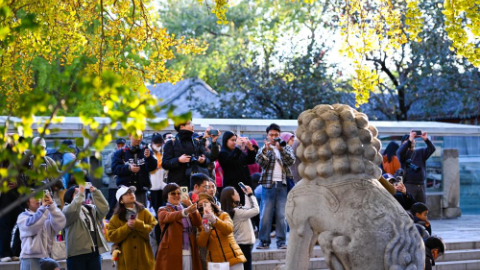China's Supreme People's Court reveals how it handles cross-border video court divorce trial based in Thailand
China's Supreme People's Court (SPC) on Monday detailed how it recently handled a cross-border video court trial step by step regarding a divorce dispute case between two Chinese people residing in Thailand.
The Qinhuai District People's Court in Nanjing, East China's Jiangsu Province held a closed hearing in accordance with the law on the divorce case between plaintiff Wang and defendant Yu, the SPC said in a statement. Wang and the legally authorized representatives for both parties attended the court session. Yu, currently serving a prison term in Thailand, participated via online video link.
On October 10, the Qinhuai District People's Court issued a judgment granting the divorce between Wang and Yu and ordered Yu to pay Wang 500,000 yuan ($70,350) in divorce compensation.
Because the defendant was imprisoned abroad, key procedural issues included how to serve the litigation documents to him, obtain his statements, and enable his participation in the domestic court hearing via online video, all of which were crucial for the smooth progression of the case.
In the statement, the court detailed the procedures it used, regarding how to serve judicial documents on a Chinese national imprisoned overseas, taking and obtaining inquiry transcripts from that individual, and conducting a remote hearing in the absence of any applicable treaty.
According to the head of the SPC's International Cooperation Bureau, under the Agreement on Judicial Assistance in Civil and Commercial Matters and Cooperation in Arbitration between China and Thailand, Chinese courts may, through the Ministry of Justice, request Thai authorities to assist in serving judicial documents to Yu.
The judicial documents had to be accompanied by a Thai or English translation. However, if the Chinese Embassy in Thailand served the documents directly to Yu, during a consular visit, the request did not need to go through Thai authorities, and no translation was required. The SPC prioritized this method and successfully served the litigation documents and evidence materials to Yu through the Chinese Embassy.
Regarding the collection of inquiry transcripts from a Chinese national imprisoned abroad, the SPC said that under the Vienna Convention on Consular Relations, consular officers may collect evidence based on a treaty or, in the absence of a treaty, in a manner consistent with the laws of the host country. However, the China-Thailand treaty does not stipulate whether consular officers may conduct inquiries and record transcripts of their own nationals during consular visits.
Following its agreement, the Thai prison agreed to allow the embassy to question Yu during consular visits on specific issues related to the divorce case and to prepare transcripts. Subsequently, the Chinese Embassy in Thailand made multiple visits to the prison for this case and transmitted several inquiry records to China.
Another challenge arose from the fact that China's Civil Procedure Law only provides for the collection of evidence from abroad via instant messaging tools, without explicitly stipulating cross-border video hearings. There is also currently no applicable international treaty on this issue.
However, judging from the provisions of the Civil Procedure Law regarding video evidence collection and the basic principles and practices of international civil and commercial judicial assistance, courts in China may arrange cross-border video hearings so long as they respect the legal provisions of the country where the party is located and the party's own willingness to participate.
As Yu's willingness to attend in the video hearing fluctuated, the SPC, China's Ministry of Foreign Affairs and the Chinese Embassy in Thailand coordinated repeatedly to ensure that the session proceeded as scheduled on September 26.
Around 11 am that day, the court established a stable a video connection with the Thai prison. Yu attended remotely, responded to the court's questions, and maintained clear visuals and two-way audio. Around 11:30 am, Yu went offline, and the court continued the hearing until it concluded around 12 pm, according to the court.
According to the head of the SPC's International Cooperation Bureau, in judicial practice, and pursuant to Part Four of China's Civil Procedure Law on foreign-related civil procedures, as well as treaties China has concluded or joined, Chinese courts conduct international judicial assistance in civil and commercial matters through the competent foreign authorities.
This approach, the SPC said, "respects the judicial sovereignty of the recipient countries, safeguards the litigation rights of all parties involved, and ensures that the people perceive fairness and justice in every case."
Photos
Related Stories
- Top court cracks down on firearms
- China executes 3 convicted of sex crimes against minors
- Psychologists to have a say in juvenile cases
- Top court takes steps to improve foreign case handling
- New types of drugs spread faster in China, with prominent characteristic of younger demographic in abuse of such substances
- Chinese courts resolve 12.04 mln cases via pre-litigation mediation in 2023
- Chinese courts conclude 23.51 mln cases from January to September
Copyright © 2025 People's Daily Online. All Rights Reserved.









